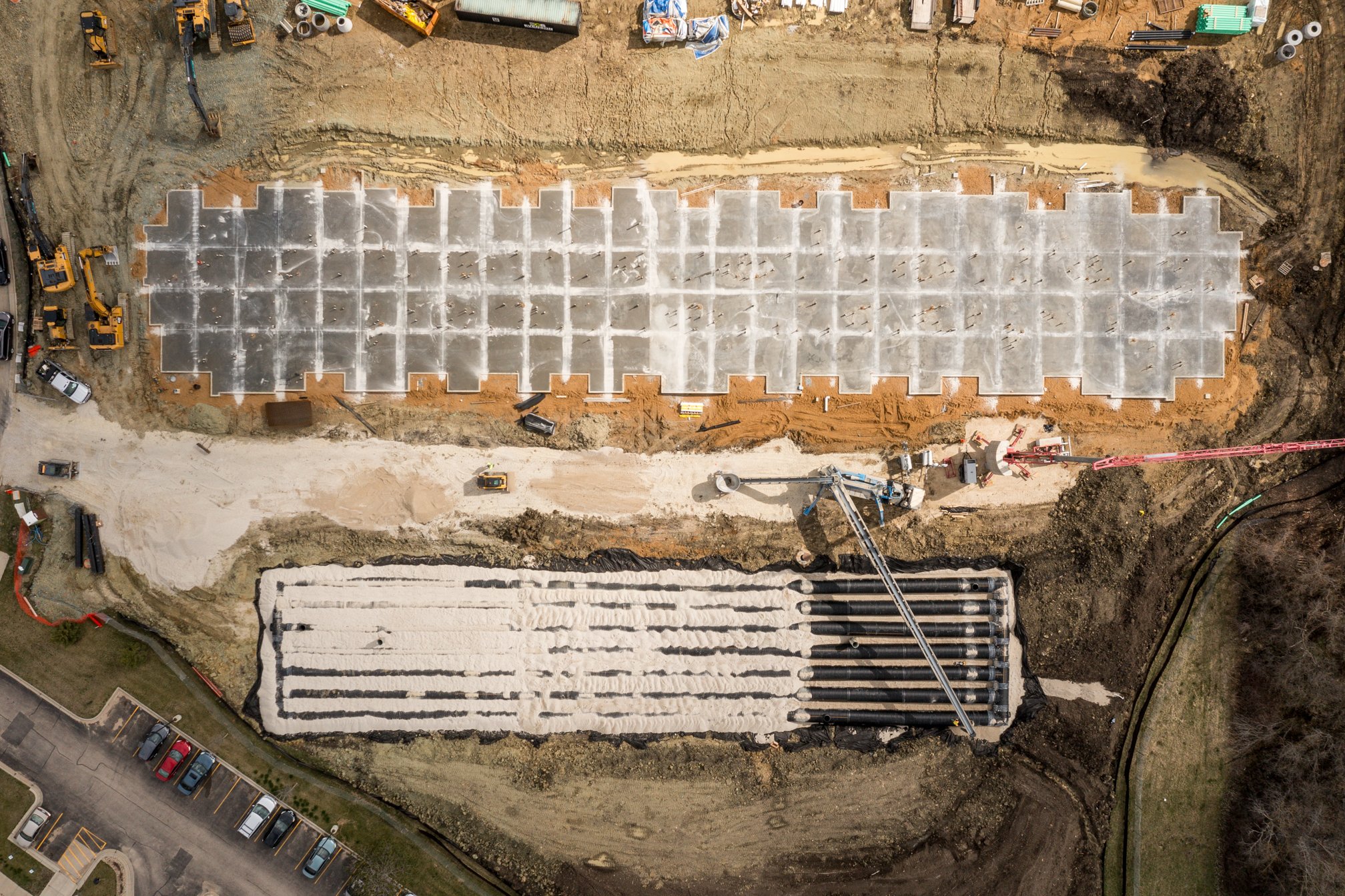
CONCRETE FOUNDATION WALLS
Exploring Different Types of Foundational Walls for Commercial Construction
In the world of commercial construction, the foundation is the core component of the architecture that every successful project is built on, literally. Foundational walls play a crucial role in providing the structural integrity and stability needed to support the entire structure. This comprehensive guide gets into the various types of foundational walls commonly used in commercial construction, highlighting their features, benefits, and applications.
At Evenson Concrete Systems, we have experts on hand to help you assess the type of foundational walls best suited for your project, but having a solid understanding of these foundation options can give you a head start on planning your next concrete construction project.
Cast In Place
Concrete Walls
Cast-in-place concrete walls are a popular choice for commercial construction projects. These walls are formed and poured on-site, offering excellent customization options and a high level of durability. The flexibility in design allows for the creation of walls that meet specific project requirements, ensuring optimal performance and structural integrity.
Slip Ledge Walls
Slip ledge walls are an innovative design that incorporates a ledge or step within the wall itself. This feature provides added stability by preventing sliding and shear failure. Slip ledge walls are particularly useful in areas with sloping or uneven terrain, where lateral stability is essential.
Structural Walls + Deep Basement Assemblies
Structural walls are designed to bear vertical and horizontal loads, making them vital components of commercial concrete construction. These walls provide support and stability to the entire structure, allowing for the creation of large open spaces without the need for additional columns or beams. The strength and versatility of structural walls make them ideal for various applications, including commercial buildings, warehouses, and industrial facilities.
Deep basement assemblies are commonly used in commercial projects that require below-grade spaces. These assemblies allow for the construction of basements that maximize usable space and provide structural support to the rest of the building. Deep basement assemblies are crucial in creating additional square footage for storage, parking, or utility areas.
One-Sided + Radius Walls
One-sided walls, also known as single-sided formwork walls, are designed to be self-supporting during construction. These walls are typically used in projects with space constraints, such as building expansions or retrofitting existing structures. One-sided walls offer a cost-effective solution by eliminating the need for temporary support structures.
Radius walls add a touch of elegance and architectural flair to commercial construction projects. These walls feature a curved design, offering a visually striking appearance. Radius walls can be used to create sweeping curves or precise arcs, enhancing the aesthetics of the structure while maintaining structural integrity.
Switchback Walls
Switchback walls, also known as terraced walls, zigzag their way up a slope or elevation change. These walls provide both functional and aesthetic benefits. They are commonly used in landscaping and commercial projects that require managing elevation changes while adding visual interest to the design. Switchback walls offer stability and can be constructed with various materials, including concrete.
Sloped Walls + Retaining Walls
Sloped walls are engineered to manage soil and water pressure in commercial construction projects. These walls are commonly used in retaining walls, flood protection systems, and stormwater management structures. Sloped walls effectively prevent soil erosion and provide stability in areas with challenging terrain or potential water flow.
Retaining walls are specifically designed to hold back soil and prevent erosion. These walls play a vital role in stabilizing slopes, creating usable spaces on uneven terrain, and preventing damage caused by soil movement. Commercial construction projects often incorporate retaining walls to optimize land use and ensure long-term structural stability.
Loading Dock Walls + Dock Pit Walls
Loading dock walls are essential components of commercial buildings that require efficient loading and unloading operations. These walls provide support and access to loading areas, accommodating the movement of goods and equipment. Loading dock walls are designed to withstand the dynamic loads and provide a safe and functional environment for loading activities.
Dock pit walls are specialized walls constructed around loading dock areas. These walls provide structural support and containment for the dock pit, which is the recessed area where loading and unloading activities take place. Dock pit walls are designed to ensure the safety and proper functioning of loading dock systems.
Concrete Pier + Hairpin Assemblies
Concrete pier assemblies are used to support heavy vertical loads in commercial construction projects. These piers are designed to transfer loads from the structure to the ground, providing stability and load-bearing capacity. Concrete pier assemblies are commonly used in bridges, elevated platforms, and structures with concentrated loads.
Hairpin assemblies are unique in their design, resembling a hairpin or loop shape. These assemblies are used to enhance the structural integrity of commercial buildings. Hairpin assemblies can be strategically placed to reinforce specific areas of the structure, providing additional strength and resistance to forces such as wind or seismic activity.
Weir Walls
A final important type of wall construction in our area is Weir walls. Weir walls are engineered to manage water flow and prevent flooding. These walls are commonly used in commercial projects that involve water management, irrigation systems, or hydroelectric facilities. Weir walls are designed to control the flow and height of water, ensuring proper water distribution and preventing overflow.
Foundational walls are an important aspect of commercial construction, providing stability, strength, and longevity to buildings. By understanding the different types of foundational walls and their applications, you can make informed decisions for your commercial projects. Whether it's cast-in-place concrete walls, slip ledge walls, or any other type of foundational wall, consulting with experienced commercial concrete contractors is essential to ensure proper design and installation.
For expert guidance and reliable commercial concrete services, contact Evenson Concrete Systems. Our team of experienced commercial concrete contractors specializes in constructing high-quality foundational walls tailored to your project's specific needs. Reach out to us today to discuss your commercial construction requirements and schedule a consultation.
